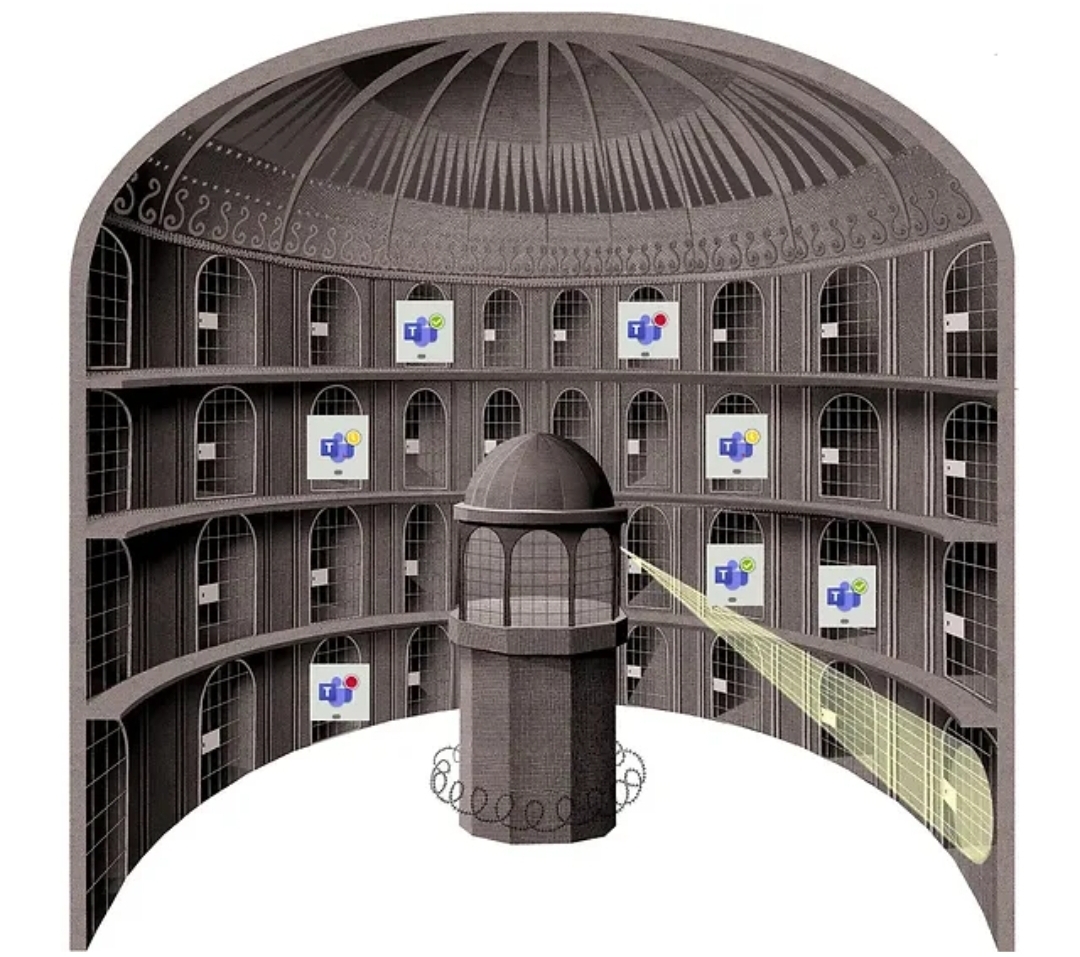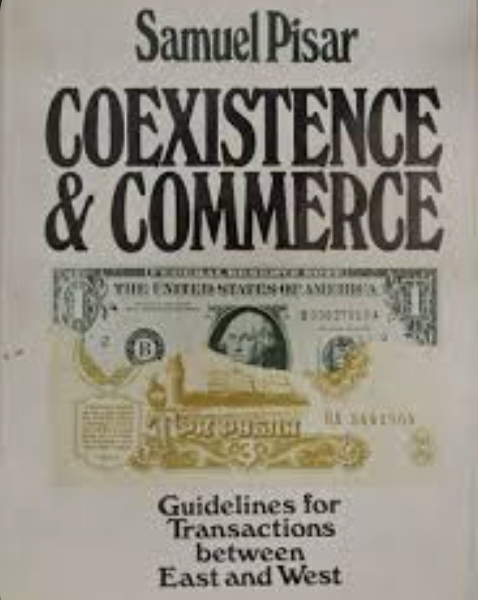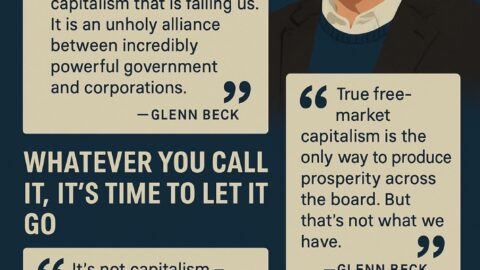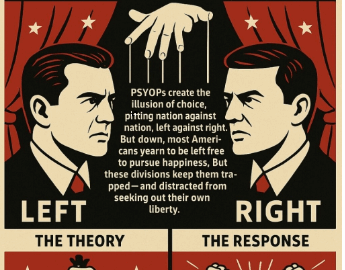By Samuel Pisar
Published: 1970
Overview
Samuel Pisar, a Holocaust survivor, international lawyer, and advisor on global trade, wrote Coexistence & Commerce to address the economic and political interactions between the capitalist West and the communist East during the Cold War. The book explores how trade, diplomacy, and strategic economic policies could serve as alternatives to military confrontation, potentially reducing global tensions.
At a time when the Cold War divided the world into two ideological camps, Pisar argued that economic engagement—rather than complete isolation—was the best way to promote peaceful coexistence. He suggested that trade between Western democracies and Eastern communist states could foster mutual interests, economic stability, and even gradual political change.
Key Themes:
Economic Engagement vs. Political Ideology – Can commerce bridge political divides?
Strategic Trade as a Diplomatic Tool – Using trade to influence, rather than antagonize, communist regimes.
Managing East-West Economic Relations – How the U.S. and its allies could balance economic opportunity with security concerns.
The Role of Multinational Corporations – How global businesses could operate across ideological lines.
Lessons for the Future – Implications for modern geopolitics and global trade.

The Cold War Economic Divide: Trade as a Bridge
During the Cold War, capitalist and communist economies operated under fundamentally different principles. The U.S. and its allies believed in free markets, private enterprise, and global trade, while the Soviet Union and its satellite states operated under state-controlled economies, central planning, and restricted international commerce.
Cold War Barriers to Trade:
- The U.S. and Western nations imposed trade restrictions on the USSR and China, limiting technological and industrial exchanges.
- The Soviet Bloc had a planned economy that discouraged reliance on Western imports.
- Political tensions, proxy wars, and ideological competition made economic cooperation difficult.
Pisar’s Argument:
- Instead of complete economic isolation, the West should strategically engage the East through commerce.
- Trade could soften ideological rigidity, encourage reform, and prevent full-scale war.
- Economic cooperation could provide leverage over communist regimes by making them dependent on Western goods and technology.
Example:
- U.S.-China Relations (1970s): Pisar’s ideas foreshadowed Nixon’s opening of China in 1972, where economic cooperation eventually led to political transformations.
The Strategic Use of Trade as a Diplomatic Tool
Pisar saw trade as a diplomatic instrument, arguing that economic transactions could shape political realities. Instead of seeing commerce only as a means of profit, he believed that Western nations could use economic incentives to promote peace, stability, and gradual reform.
How Trade Could Influence Communist States:
- Introduce Western technology and innovation, reducing the efficiency gap between planned and market economies.
- Create mutual dependencies, discouraging military aggression.
- Expose communist populations to Western goods and lifestyles, subtly encouraging shifts in political attitudes.
- Encourage economic reforms, as communist states sought to compete with capitalist economies.
Risks & Challenges of Trade with Communist States:
- Could trade empower authoritarian regimes without leading to meaningful change?
- How to balance economic interests with national security?
- The risk of technology theft or misuse for military purposes.
Example:
- The 1975 Helsinki Accords later incorporated Pisar’s ideas—linking economic agreements with human rights provisions, promoting peaceful engagement while maintaining pressure on the USSR.
Managing East-West Economic Relations: Cooperation Without Surrender
One of Pisar’s key challenges was finding the right balance between engagement and containment. He warned against blind economic cooperation, which could strengthen communist regimes without political concessions.
Key Strategies for Managing Trade:
- Controlled Access to Western Technology – Allow trade but restrict advanced military-use technologies.
- Reciprocity – Require communist states to open their markets rather than relying solely on Western exports.
- Multilateral Trade Agreements – Use organizations like GATT (General Agreement on Tariffs and Trade) to create stable economic frameworks.
Example:
- Western Europe’s Ostpolitik (1969-1974): West Germany pursued economic engagement with East Germany and the Soviet Union, improving relations while maintaining its Western alliances.
The Role of Multinational Corporations
Pisar saw multinational corporations (MNCs) as crucial players in the Cold War economic landscape. While governments debated policies, corporations were already seeking ways to trade across ideological lines.
Potential Roles of MNCs:
- Act as neutral economic mediators between East and West.
- Spread Western technology and management practices into communist economies.
- Expand economic interdependence, making conflict less desirable.
Concerns About Corporate Influence:
- Could MNCs undermine national policies by prioritizing profits over security?
- Would corporations enable economic espionage or technology transfer to hostile states?
- How to regulate ethical business practices in totalitarian regimes?
Example:
- PepsiCo in the Soviet Union (1970s): Pepsi became one of the first American companies to enter the Soviet market, trading soda for vodka, illustrating the possibilities of commercial diplomacy.
Lessons for the Future: Relevance Today
Although written during the Cold War, Coexistence & Commerce remains highly relevant in today’s globalized world, particularly regarding U.S.-China relations, Russia’s economic strategies, and the role of technology in international power struggles.
Modern Parallels:
- U.S.-China Trade Relations – Just like the U.S. debated engagement with the USSR, today’s policymakers debate whether trade with China leads to reform or strengthens authoritarianism.
- Russia’s Economic Integration & Sanctions – Following Russia’s 2022 invasion of Ukraine, Western nations used economic sanctions as a geopolitical tool, reflecting Pisar’s argument that economic relations should be carefully managed.
- Tech Wars & AI Competition – Pisar warned about technology control in trade, a concern echoed today as nations restrict AI and semiconductor exports to geopolitical rivals.
Final Takeaways:
- Economic engagement can reduce global tensions, but only if structured carefully.
- Trade policies should serve long-term geopolitical strategies, not just short-term profit motives.
- Nations should use commerce as leverage, ensuring that economic cooperation aligns with security and ethical considerations.
Conclusion: A Visionary Approach to Global Trade
Coexistence & Commerce is a powerful analysis of how economic policies shape international relations. Pisar’s insights on using trade as a diplomatic tool, a mechanism for engagement, and a strategy for stability remain relevant in today’s shifting geopolitical landscape.
His work challenges us to consider how modern global trade can either promote peace or empower authoritarian regimes—a question that continues to shape 21st-century politics.
A must-read for policymakers, economists, and anyone interested in the intersection of trade, politics, and global security.
Transcripts from the video:
Whitney Webb:
So I would argue that one of the reasons, or what we can look to, is sort of one of the markers of this whole trend, beginning of this sort of bleeding of national security, state issues between countries when it really doesn’t make any sense.
An example I like to bring up is a man named Samuel Pisar. You may know him as the stepfather of Anthony Blinken. He was also a prominent lawyer for big tech companies and a lot of other corporations. Also a very good friend and close relation to Robert Maxwell. Delane Maxwell’s father, and he wrote a was very active in what he said was sort of smoothing over relationships between East and West during the Cold War. But essentially what he said in testimony to Congress in the early 70s is that there was the rise of what he called the trans ideological Corporation, where you essentially have the cap, you know, the multinational corporations, many of them based in the West, making joint ventures with the communist owned, state owned enterprises in the East, Russia and China, and that these were essentially fusing to form an economic structure that was unaccountable to any government in the world.
And when asked if this that he if he thought this development was a good thing, he essentially said, Yes, it was. And that was back in the early 1970s and nothing was really done about it.
And you have to kind of ask why. Why is that? And it’s kind of interesting, too, for those that subscribe to, you know, the the thesis of someone like Carol Quigley, who wrote many decades ago about this idea of the round table groups and all of that.
- Tragedy and Hope: A History of the World in Our Time (Oligarchy & the Illusion the Two-Party System)
- The Naked Capitalist
- World War 3 Isn’t What You Think; It is the Globalists vs the Rest of Us
- The Global Financiers Agenda to Gradually Takeover Government and Industry: The World
- We Need To Wake Up and Stand With the 99%
You know, sort of Cecil, coming from Cecil Rhodes and Britain and efforts to sort of remake the British Empire at a global scale through covert means. You know, they essentially, that thesis essentially argues about creating an unaccountable economic entity as as the means to doing that, a blob, if you if you will, that’s probably the easiest way to understand it.
And essentially, I think what we have arrived at as a consequence of that type of, you know, behavior, and you know that situation is a situation where we essentially have the nation states acting as enabling environments for policies that are often drafted at the at, you know, the international level, by think tanks.
And I’m sure the most notorious of those are things like the World Economic Forum, but there’s the Council on Foreign Relations, there’s Chatham House, there’s CSIS. I mean, there’s a lot of these entities around. And, you know, oftentimes congress people aren’t really directly writing the policy. The policies they’re voting on, their handed laws. And a lot of sometimes, those are developed from these think tanks, which are funded largely by, you know, multinational corporations. And sometimes, you know, directly by big tech oligarchs like Bill Gates, for example.
And those are sort of, you know, shopped, not just, you know, in one country, but oftentimes in multiple countries. And so you sort of get multiple countries agreeing to enact the same policy framework for a variety of things.
You know, some people have argued that’s why, you know, essentially globally, there was sort of lockstep agreement about what policies to enact in the situation of COVID 19, and also why, you know, extensible adversaries, like Russia, China, the United States, most of the West all agree about the, you know, sustainable development goals of the United Nations, which, if you actually look into the SDGs, a lot of it is about sort of pushing us into this Fourth Industrial Revolution, where life becomes increasingly digitized and increasingly surveilable, and really, I would ultimately argue, is about the creation of of new markets at the end of the day.
And a lot of the push for digital ID is in that. And that’s why some have argued that this is sort of a policy that’s being implemented globally. And it is true. You know, digital ID in particular, sort of I think the first time most people heard about it might have been in COVID 19, but in the post COVID era, digital ID has made, you know, it’s been popping up essentially in every country around the world. So has surveillance, programmable and seizeable money, whether in the form of cbdc or its private sector equivalents.
And I think it’s fair to say that, you know, in countries like United States, where they don’t want to have a cbdc, for example, private sector is going to produce it, and they’ve done that in many occasions to make it sort of, I think, more palatable, you know, to a more liberty minded public.
It’s not coming from the state, it’s coming from the private from the private sector. But ultimately, you know, the end result in the you know, the policy is essentially the same. And so, you know, in a sense, yes, I guess some would argue that that is globalism in a nutshell.
And technocracy, which I mentioned earlier, you know, was an actual movement, and that particular movement built around this organization called technocracy Inc, which the Canadian branch of which was led by Elon Musk grandfather um, that argued for the creation of all these different unions around the world, these different techniques, like a European Union, An African Union, a North American Union, etc.
And that the the goal was to sort of push that, some have argued, via the idea of this multi polar world, where you sort of ending the unipolar model. And I think that’s, you know, essentially, what, what we what has happened, essentially.
Tom Bilyeu:
okay, well, let me, let me see if I can boil this down. Make sure I understand it. Globalism is a much bigger move than certainly I would have thought, started much earlier than I would have thought that has really fused governments together with these transnational corporations that the play in this moment, as you begin thinking about what is the end game? Reasoning for all of this is to open new markets, to concentrate power in the hands of the elites, to really give people a way to control policy at the global level, but not having it be championed by the governments, but instead be championed by the private sector.
So it feels more palatable that it’s coming from the individuals, but ultimately, much of this is happening out of sight that we are not questioning many of the things that we should have, the scandals would bubble up, but they would never be pursued to their logical conclusion, so that we could end up connecting the dots see who the finite group of players are that are really moving this forward.
To that end, you said something that I saw in my research that I found very interesting, which is, when thinking about Jeffrey Epstein, stop following the sex and start following the money.
And that it is far more compelling what He did to prop up or collapse national currencies than the sex stuff, and that, in fact, the sex stuff may be being used by the people involved as a way to distract you from the part that actually matters. Which is the currency manipulations. How did I would
Whitney Webb:
I would add to that. Also, since I brought up China Gate, that it appears that Epstein had some sort of role in that as well, because a lot of his visits to the Clinton White House in the mid 1990s were with a man named Mark Middleton, who was one of the key figures in the Clinton administration, actively involved in China Gate at that time, and at the time that was going on, Leslie Wexner, who Jeffrey Epstein worked for during that time, essentially took over Southern Air Transport, which had previously been the CIA owned airline and was involved in the Iran Contra scandal of the 1980s had previously been in Miami.
- Patterns of Dominance Over Nations Through Financial Manipulation, Corruption, and the Exploitation of Local Elites
- American War Machine: Deep Politics, the CIA Global Drug Connection, and the Road to Afghanistan
- Whiteout: The CIA, Drugs, and the Press
- The Politics of Heroin: CIA Complicity in the Global Drug Trade
- Dark Alliance: The CIA, the Contras, and the Crack Cocaine Explosion
- Operation Gladio: The Unholy Alliance between the Vatican, the CIA, and the Mafia
He brought it to Columbus, Ohio to move cargo from Columbus, Ohio to China, and there were Ohio law enforcement officials at the time that called it the mayor Lansky run because they felt like it was tied to some sort of organized criminal activity.
And when you consider that, there’s also evidence that Epstein hadn’t been involved with arms trafficking back in the 80s, and maybe in the 70s, to an extent as well that certainly warrants investigation, I would believe, and I think it’s that’s part of why, when most people talk about the Epstein Clinton relationship, they tend to avoid the Epstein Clinton relationship when Clinton was in office and focus almost exclude, almost exclusively on when Clinton was out of office, i.e. post 2000 and I think that is problematic and really needs to be looked at especially. And again, you know, local Columbus police wrote a report of linking Leslie Wexner to organized crime, and it was suppressed at the highest levels of the Columbus PD, but that was the opinion of investigators working on the murder of his tax attorney. He was shot in broad daylight like shortly before he was supposed to testify to the IRS about tax evasion.
So again, there’s really not a lot of interest in looking at major aspects of the Epstein case. And so, you know, that’s something I focused on in my book.
Obviously, but I think it’s a very good example in part, due to the enduring public interest in that case, I think it very effectively shows that there are certain places that despite the public interest, there are places most people will not go in terms of trying to investigate what really happened there and get to the truth of the matter.
And this takes me back to my point earlier, that people cannot make informed decisions without being empowered with knowledge, and that knowledge requires effective, unbiased reporting, and it requires transparency.
And unfortunately, we have a major lack of both of those two things, and I think part of that is unfortunately, because there really aren’t a lot of Investigative Journalists anymore, and I think a lot of people in independent media, which is supposedly the new media, now, are much more influenced by what gets clicks and the algorithm than they are following stories that really matter, because that’s not necessarily where the money is or where the cloud is.
Tom Bilyeu:
Yeah, there is. There’s certainly a fractal to open up there. I don’t consider myself a journalist. I have no interest in becoming a journalist, and I do like what New Media brings, but I don’t like that journalism itself has been relegated to such a small piece of the media landscape. So I hear you.
Whitney Webb:
I’m not trying to dump on the new media paradigm entirely, but I think there should be multiple types of journalists working in it, and that there should be people that investigate and dig into these inconvenient facts and things like that and act as watchdogs, and also people that help popularize content and are more focused on the algorithm and metrics, because that is the reality of content distribution today. But I’m saying there’s a noticeable dearth of one of those things, and I think it would the public would be very well served by that changing.
Tom Bilyeu:
Yeah, no. Agreed question is, how you bring economics to it?
Okay, so I’m always trying to build a mental model that allows me to predict the movements of the world. That might be an easy way, or to at least understand how if I do X, Y, Z thing, I’m gonna get a certain outcome for me to make sense of all the things that you’re saying.
I don’t see a way to make it make sense without going, Oh, they actually don’t. They. The elites, which I defined earlier, same definition applies here. The elites don’t want, or at a minimum, don’t care about, a thriving middle class, be because if they’re going to make globalism work in a populist moment, which is fucking fascinating, that the game really becomes about moving them doing a massive wealth transfer through means that I had never considered before, because my thing is always like, well, hold on, these guys are going to realize that you need a thriving middle class.
Otherwise they come for your head, but they don’t come through your head. If you keep them scared enough and you’re providing the protection, and then you really can continue to hollow out the middle class and make a futile, a NEO futile, social structure which seems crazy and impossible to believe.
And admittedly, I am more entertaining this line of thought than I am adopting it. But if you are using technology as a way to surveil and suppress then, if you believe that that’s an inevitability and a necessary way to stay safe in the new global stage, then a nice added benefit is that you can use it to Create the Panopticon.







